Why Do Cats Smell Your Breath? (10 Reasons)
In the mystifying realm of cats, their captivating quirks never cease. One such fascination: their curious urge to sniff our breath. Cat owners, you’ve surely encountered this intriguing moment.
But why do cats smell your breath? Cats have a keen sense of smell that helps them detect changes in their environment, identify predators or prey, acquire information about you, and even understand your health. Furthermore, cats are drawn to warmth, so the warmth and scent of your breath attract them.
Your breath also carries traces of food, which could pique their interest. Overall, when your kitty smells your breath, it’s a combination of their instincts, curiosity, and their bond with you.
Looking for more articles about cats:
All The Possible Reasons Why Your Cat Small Your Breath
As mentioned, cats use their developed sense of smell as a tool to gather information about their surroundings, including the fragrance of their beloved owners. Let’s discuss the various possibilities that might explain why your feline is so interested in your breath.
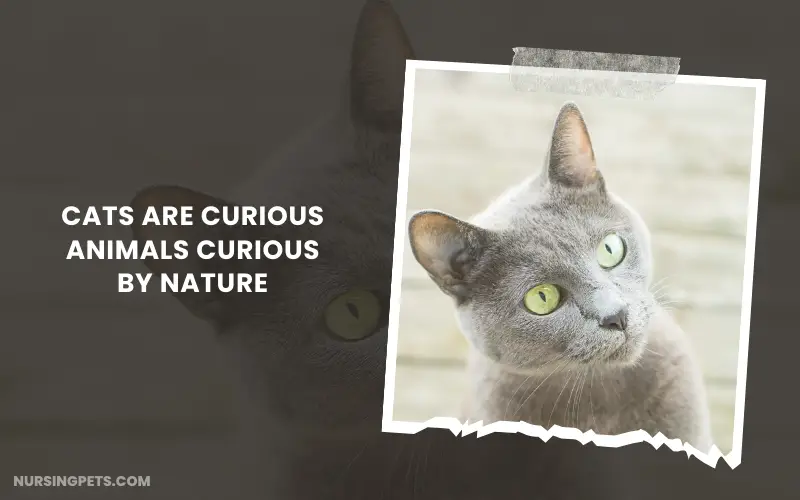
01. Greetings and Bonding
Above all else, when your cat takes a keen interest in smelling your breath up close, it’s typically a heartfelt gesture of greeting and strengthening the bond between you. Cat believes that this action serves as a powerful way to solidify the connection you have with her.
02. Food-related Attraction
As you know, cats have a keen sense of smell that allows them to detect even the smallest aromas in the air. If you’ve recently eaten something appealing to them, they may be drawn to the residual scent on your breath. The aroma of food can be enticing to cats, even hours after you’ve eaten.
03. Stress Reduction
Believe it or not, your breath can help your puss reduce stress. The distinct smell of their human companion holds a remarkable power to soothe them and induce a sense of calmness. It’s truly fascinating how such a simple aspect can have such a profound impact on your cat’s well-being. (source)
04. Inquiring Mind
Cats are curious. They find your breath smells intriguing and interesting. So, your cat tries to understand aromas coming from your mouth. Smelling your breath is one way for them to explore something new or unfamiliar.
05. Learning and Identification
Our feline companions are remarkably astute learners, and the act of smelling your breath serves a significant purpose for them. It allows them to gather valuable information and identify you as the owner. Cats can recognize your distinctive scent and form a strong association with your presence.
06. Warmth and Attention
Sometimes, when your cat is incessantly sniffing your breath, it could be because they seek warmth or desire your undivided attention. Your breath might radiate a cozy warmth that attracts them, or they might simply want a bit of extra TLC (tender loving care).
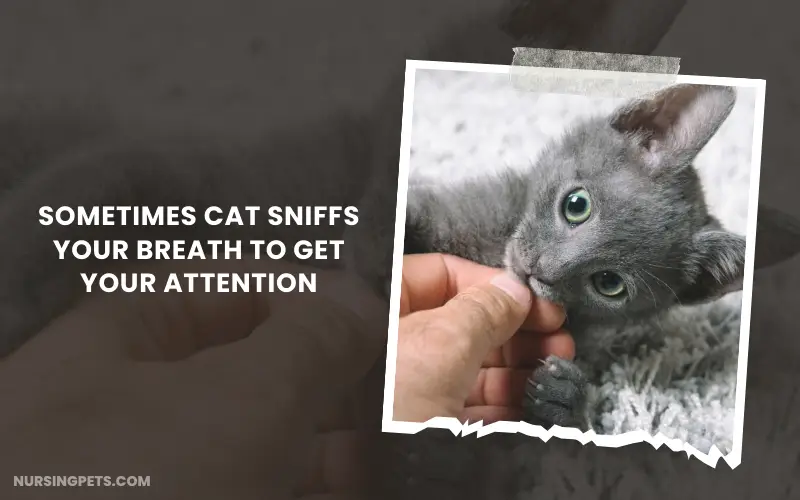
07. Scent recognition
Your breath carries a plethora of scents that your cat’s highly sensitive nose can detect. From the remnants of the food you’ve consumed to the lingering fragrances of medications, they are keen observers of these olfactory clues.
08. Social behavior
The sense of smell plays a pivotal role in feline communication. If your cat catches a whiff of your breath, they gather essential information about your recent activities, adventures, and any alterations in your unique scent profile.
This interplay of scents forms an intricate language between you and your cat, adding another layer of connection and understanding to your relationship.
09. Reinforcement
For some cats, smelling your breath can be a form of reinforcement. As long as they associate the scent of your breath with positive experiences such as receiving attention or tasty treats, they may deliberately seek it out to encourage similar interactions.
10. Health-related Reasons (Dental Issues)
In extraordinary cases, your cat’s interest in your breath could be a sign of its remarkable ability to sense health-related changes. Cats have been known to exhibit peculiar behaviors whenever they detect underlying health conditions in their owners, such as diabetes or dental issues.
While some of these reasons are commonly observed in cat behavior, others may be unique to individual cats. Each kitty has its quirks and preferences, so embrace this unusual behavior as a testament to the special bond you share with your feline companion.
Why Does Your Cat Smell Breath When You Sleep?
As mentioned, cats have a sharp smell perception, and they can smell your breath while you sleep to find out more about yourself. They might be attracted to familiar pheromones or seek the warmth and comfort of your breath. Also, It can be a way for them to bond and show affection.
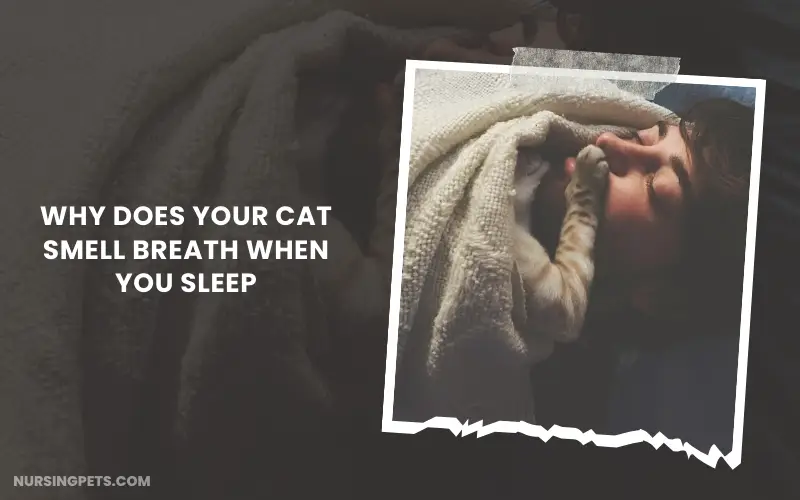
Does my cat think I’m dead when I sleep? Concerns about cats and their behavior during sleep are valid. However, rest assured that the answer to this question is straightforward: your feline does not perceive you as deceased when you are asleep.
During your sleeping, Your kitty can detect changes in your breathing or body temperature. They can also differentiate between awake and asleep. So, your puss knows you are alive and just taking a rest.
Do Cats Like The Smell of Humans Breathe?
Cats have a natural curiosity and are known for being interested in various scents, including the smell of their owners’ breath. The scent of human breath might not top their favorites list, but individual preferences may vary.
However, there is no definitive answer as to whether cats universally like the smell of human breath, but there are several possible reasons why they exhibit this behavior.
Understanding a Cat’s Perspective
Cat sense of smell is far more acute than that of humans, with a whopping 200 million scent receptors compared to our mere 5 million! However, human breath might not captivate them like the aroma of fresh fish or catnip.
They show curiosity towards their human breath due to familiarity, emotional connection, or individual personalities rather than the smell itself.
Each cat has unique preferences, and factors like familiarity, emotional bonds, and personal space influence their response to human breath. Some cats may find comfort and security in their human scent, while others may prefer keeping their distance. Respecting a cat’s boundaries is vital for a harmonious relationship.
Do Cats Check If You’re Breathing?
Cats are highly intelligent creatures that are extremely conscious of their environment. They may notice when you are taking shallow breaths, have stopped breathing, or are distressed.
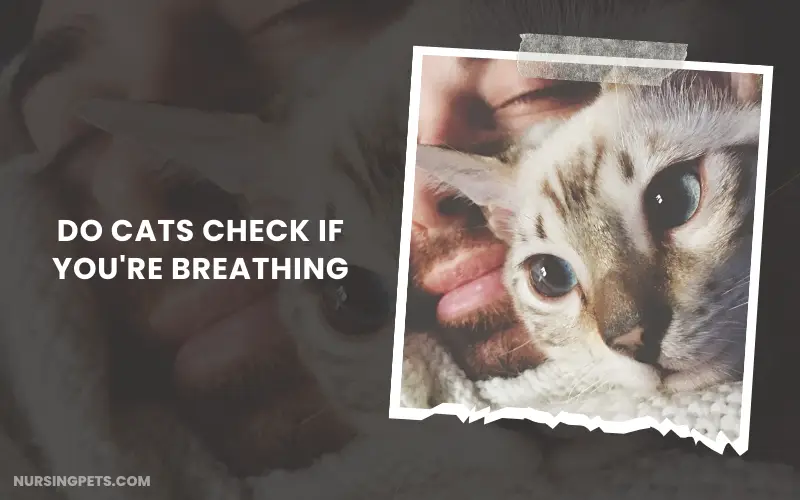
In case your breathing becomes shallow or stops for an extended period, your kitty will likely notice and respond in some way. They may meow, paw at you, or come closer to investigate.
Feline also uses their sensitive whiskers to detect changes in airflow near your nose and mouth.
Overall, cats are very conscious of their environment and their owners. They may notice if you are taking shallow breaths, have stopped breathing, or are distressed.
How to Prevent Your Cat From Smelling Your Breath?
Now that we understand why our beloved cats are drawn to sniffing our breath, the next important question arises: How can we discourage this potentially unpleasant behavior?
The good news is that there are effective strategies to prevent our cats from engaging in this habit. Let’s explore some practical steps to achieve this:
Brush Your Teeth Regularly
To maintain a pleasant environment for your feline friend, it’s advisable to prioritize your oral hygiene by brushing your teeth at least twice daily. By doing so, you effectively eliminate bacteria and dislodge lingering food particles that contribute to unpleasant breath.
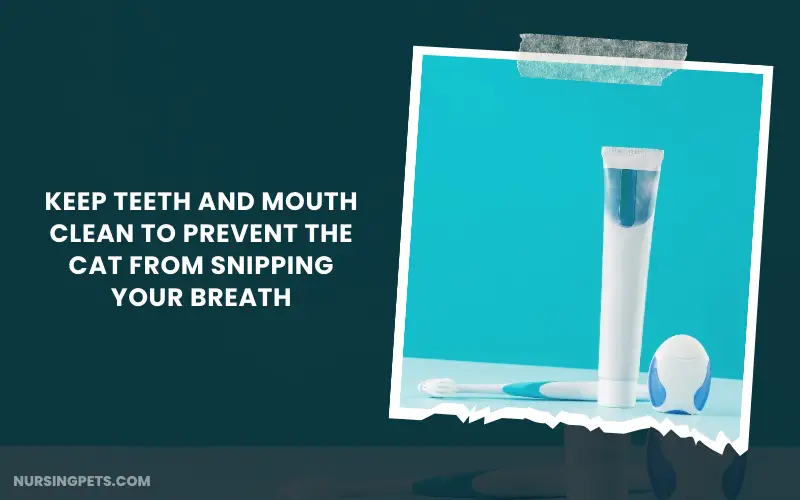
Use Antibacterial Mouthwash
If you’re looking to keep your breath fresh, using a mouthwash that kills germs can be highly effective. To make the most of its benefits, simply swish the mouthwash around in your mouth for about 30 seconds before spitting it out.
This allows the powerful ingredients to work their magic in combating bacteria and freshening your breath.
Chew Sugar-Free Gum
Chewing sugar-free gum can provide a temporary solution for freshening your breath. It stimulates saliva production, which helps wash away odor-causing bacteria. Opt for a sugar-free variety to minimize plaque buildup and maintain good dental health.
Avoid Eating Highly Aromatic Foods
Certain foods like garlic, onions, and spicy dishes can leave a strong scent on your breath. Consuming these foods can make it more challenging to prevent your cat from detecting odors. In case you want to minimize the chances of your feline smelling your breath, try to avoid consuming such foods or limit their intake.
Distraction and Redirection
As long as you notice your cat showing interest in sniffing your breath, redirect their attention to a more appropriate activity. Engage them with interactive toys, initiate playtime, or offer treats to divert their focus away from your breath.
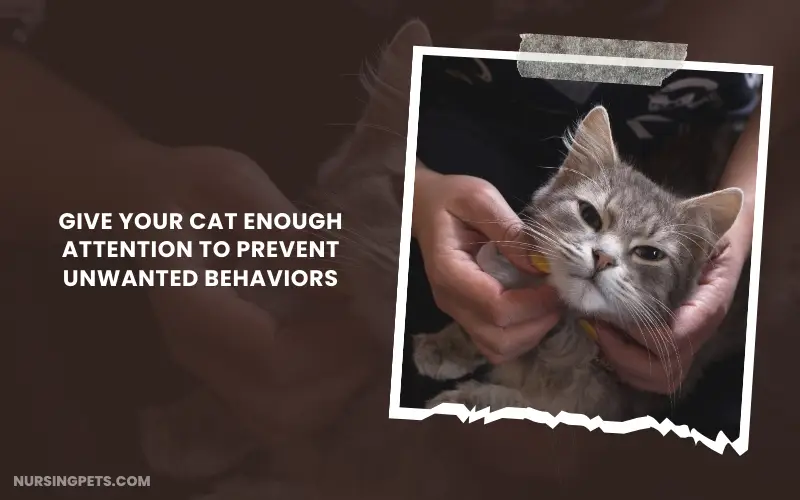
Give Your Cat Attention
Giving your cat attention can help distract them from smelling your breath. When you’re home, you can give them plenty of petting and cuddles.
So, don’t forget to brush and floss your teeth every day, rinse your mouth with a minty mouthwash, eat more fruits and veggies, drink less coffee, and chew some sugar-free gum. These habits will not only improve your oral hygiene but also make your cat less interested in your breath.
Frequently Asked Questions
Final Word
Through their keen sense of smell, cats gather valuable information about their environment and its individuals. When they sniff your breath, they gather unique scents and flavors that help them become more familiar with you and your world.
So don’t be offended or annoyed by your cat’s breath-sniffing behavior. It’s just their way of saying they care about you and want to be close to you!
Article Sources:
- https://www.cbsnews.com/philadelphia/news/dogs-and-cats-can-detect-illness/
- https://phys.org/news/2020-10-evidence-cat-mimicking-human-behavior.html
- https://www.sciencedirect.com/science/article/abs/pii/S0168159121002318

